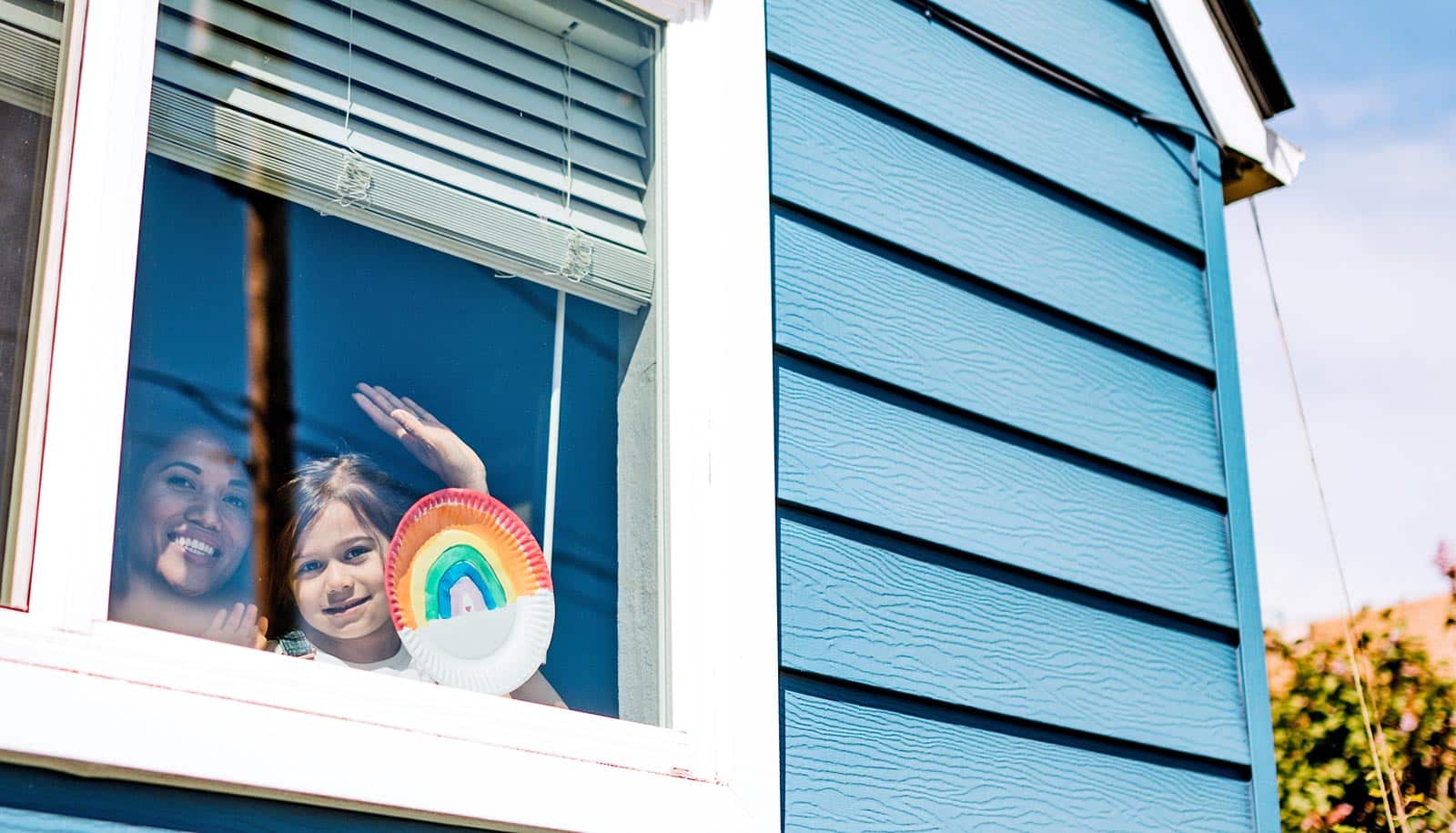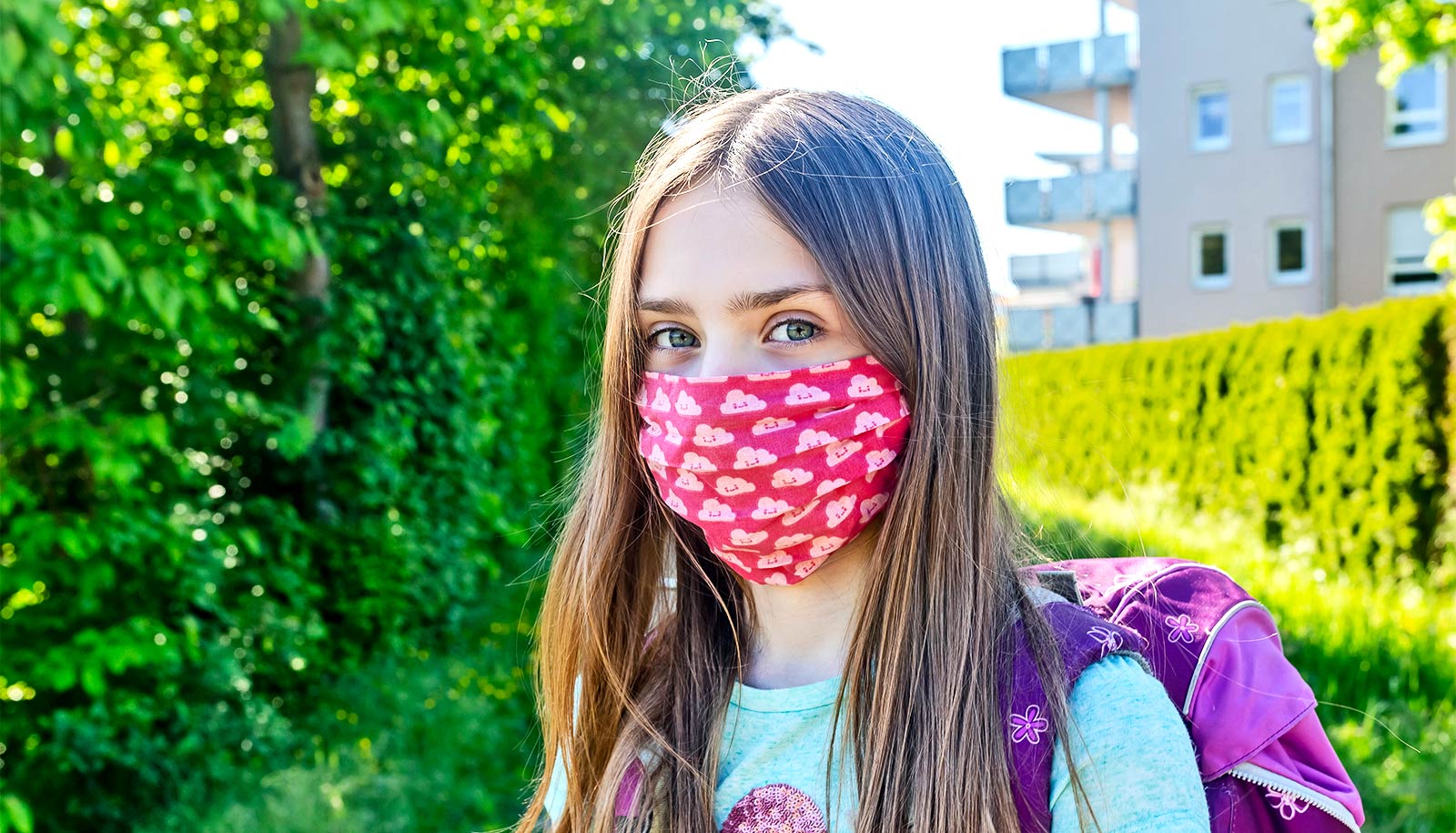An expert in child psychology has advice for how parents can keep a routine, manage COVID-induced stress, and support their children’s changing needs.
Recent studies show that parents (namely working parents) are experiencing mounting levels of unrelenting stress as they grapple with choices about their work-life balance, the future of their children’s education, and how to keep their families safe.
“It is important parents have patience with themselves.”
Given these complicated and ever-evolving circumstances, Nick Wagner of Boston University teamed up with a group of fellow researchers to launch the Families And Children’s Experiences (FACE) of COVID-19 Study. The ongoing and international study explores the effects of COVID-related lifestyle changes on children and families in an effort to identify which contextual features are most effective in helping parents and children cope with the crisis.
Wagner, assistant professor and director of the Biobehavioral and Social-Emotional Development Lab, answers questions here about how parents can talk openly to their children about COVID-19, navigate emotional hardships, and prioritize their mental well-being:
How should parents talk to their young children about the coronavirus pandemic?
Even at young ages, children are acutely aware of illness and death, and they are sensitive to stress in the family. Children will have almost certainly heard about the COVID-19 pandemic, so the first important thing for parents to do is to listen. Parents should listen openly and allow children to talk freely, without too many guiding questions. Parents can ask open-ended questions and try to find out how much their children already know about the pandemic, and to assess any conclusions they’ve drawn about the implications of the pandemic for their safety and the safety of their families.
Next, parents should answer their questions as honestly as they’re able. Of course, parents must consider their children’s age and the types of difficult conversations they’ve had in the past so that the discussion can be properly scaffolded, but (age-appropriate) honesty and openness are usually the best strategy for any child.
During these conversations, it’s important for parents to know that it’s okay not to have all of the answers. Children will experience stress, conflict, and difficulties throughout their lives. It’s a parent’s job to help children through these experiences, not to try to ensure they won’t occur.
Most important is that parents are clear about the support the child has during these uncertain times. Children, like many of us, will be feeling scared or confused. Parents should create space for children to share these feelings and can also express how they’re feeling as well. It’s always good to label how we’re feeling and how our children might be feeling, and to help children connect those feelings with their potential causes. This helps kids develop emotional intelligence, the ability to recognize feelings and situations which may cause them. Parents may want to talk about things they do when they feel scared or angry, and they can also help their children come up with ideas of strategies they can try.
During these conversations, it can be good for parents to highlight all of the things our communities are doing to help keep people safe. That we all wear masks because we’re in this together, and that everyone is working to make things better. Parents can focus on stories of people who are working to stop the spread of the virus or who are caring for those who are sick. Finally, parents should emphasize that this is temporary, and that the child’s family will always be there to support and care for them. It’s nearly impossible to give too many hugs or to say “I love you” too many times (unless you’re asking a teenager, of course!).
What should parents understand about stress and trauma as they relate to the pandemic? How can parents best support their children during this time?
While research on this specific pandemic is ongoing, studies examining the impact of previous pandemics (e.g., H1N1, Ebola) and natural disasters have documented increases in aggression and PTSD related symptoms. We’ve found in our own preliminary work that parents’ worries about and exposures to COVID-19 are linked with increases in children’s aggressive behaviors.
Clearly the pandemic has impacted all of our lives, but the lives of children have been disrupted through home confinement, school closures, limited social interactions, and reduced access to playgrounds and the like. In addition to the disappointment of not being able to have the planned birthday party or not seeing a new classroom on the first day of school, the uncertainty brought on by the pandemic threatens the routines and structures which help support children’s emotional security.
This body of research would suggest that we’re likely to see changes in the ways in which children react to their environment. Things that seem small and may not have triggered an intense emotional reaction in the past may do so now. Parents may also see changes in how children attempt to regulate their exposure to conflict and uncertainty caused by the pandemic. Children may become more avoidant or distant, or parents may see children attempting to take on more personal responsibility for alleviating the stress and difficulties now apparent in most homes.
When parents are faced with these changes in their children, they should first remember that these sorts of adaptations to stress and conflict are normal. Parents may need to provide more structure for new experiences, or to say things that could have gone unsaid in the past. Removing unnecessary uncertainty from a child’s life can help them to cope with the uncertainty we can’t control. Parents may find themselves reading more bedtime stories or being asked to carry their (now very heavy!) children more often than before. All of this is normal, and the extra stories will help.
Based on your research and expertise, how is the pandemic shaping children’s development?
Something we should keep in mind is how vital peer interactions and relationships are for the developing child, and, in particular, young children. In addition to the parent-child relationship, which is of course critical, peer relationships are fundamental to children’s healthy social and emotional development. This is because relationships with similarly-aged peers are characterized by a unique symmetrical power dynamic which affords children the opportunity to develop perspective-taking skills, social competence, and advanced moral reasoning. To put it simply, kids can explore the dynamics of social relationships with other kids in ways that just aren’t possible with adults. In addition to the academic implications, this is one of the biggest impacts of our necessary move to remote learning in most communities.
What activities (on or offline) do you recommend parents introduce into their child’s daily routine?
There are ways parents can support social interactions for their children over the internet, and I’ve seen teachers and parents alike develop very creative and effective ways of supporting children’s online relationships. First, what might work best in terms of setting up online play dates or other social experiences will vary for each child. Parents should consider their child’s age, attention capacities, interests, and the like when planning online activities. For younger kids, I’ve found it’s best to provide some structured or planned activities, while still leaving space for creativity and exploration.
Parents can also schedule (yes, schedule) time for child-directed play. This means parents put away anything that might distract them from the play and follow their child’s lead in whichever activity they’d like. In addition to the added comfort of the structure and attention, this sort of “child-directed” play can provide opportunities for children to flex their creative muscles, and to receive positive reinforcement along the way, all things they do with their peers under normal circumstances. Very often, 5 or 10 minutes of scheduled play can go a long way.
What should parents do if their children start acting out?
First and foremost, all children misbehave, especially when tired, hungry, confused, or frustrated. Second, as counterintuitive as it may seem, the best way to dissuade behaviors we don’t want to see is to reinforce behaviors we do want to see. Particularly now, parents should take every opportunity they can to praise and give attention to those behaviors which they do want to promote. When faced with difficult behavior, parents should try to catch it early and redirect children’s attention to something more positive.
Try to notice signs that may indicate an impending outburst and attempt to engage your child in something positive before things can start to spiral. Depending on a child’s age, the use of consequences for difficult behavior can help teach children responsibility for their actions. A few suggestions regarding the use of consequences:
- Consequences should be given in response to specific behaviors.
- If possible, children should be given a choice to follow instruction before receiving a consequence.
- Parents should remain as calm as possible when giving consequences.
- Once a consequence is over, children should be given the opportunity to do something good and receive praise. Time-out can be a very effective strategy for parents to use, so long as it’s done in a consistent and structured way.
How can parents best navigate their own social and emotional hardships during the pandemic? What is most important to practice or keep in mind?
Research tells us that our parenting is impacted by our own psychological resources, characteristics of our children, and our networks of social support. The pandemic has immeasurably disrupted all three of these determinants of parenting. I think it’s important for parents to try to keep in mind that the situation we collectively find ourselves in is not normal. Parents are being asked to juggle childcare, work, financial insecurities, and our health and the health of our families. It is important parents have patience with themselves. As impossible as it is, parents should work to make time to engage in activities they enjoy and to stay connected with friends. Even something as small as taking a short walk or watching a favorite TV show can help. Self-care isn’t an indulgence, but instead is part of keeping a healthy mind and body.
Additionally, evidenced-based treatments do exist, including psychotherapy, medication, and other treatments like mindfulness meditation. As is the case for our children, mental health providers have introduced telehealth services and free apps offer access to guided resilience coaching and educational content. Parents should not hesitate to seek out these services and prioritize their mental health.
Source: Boston University



